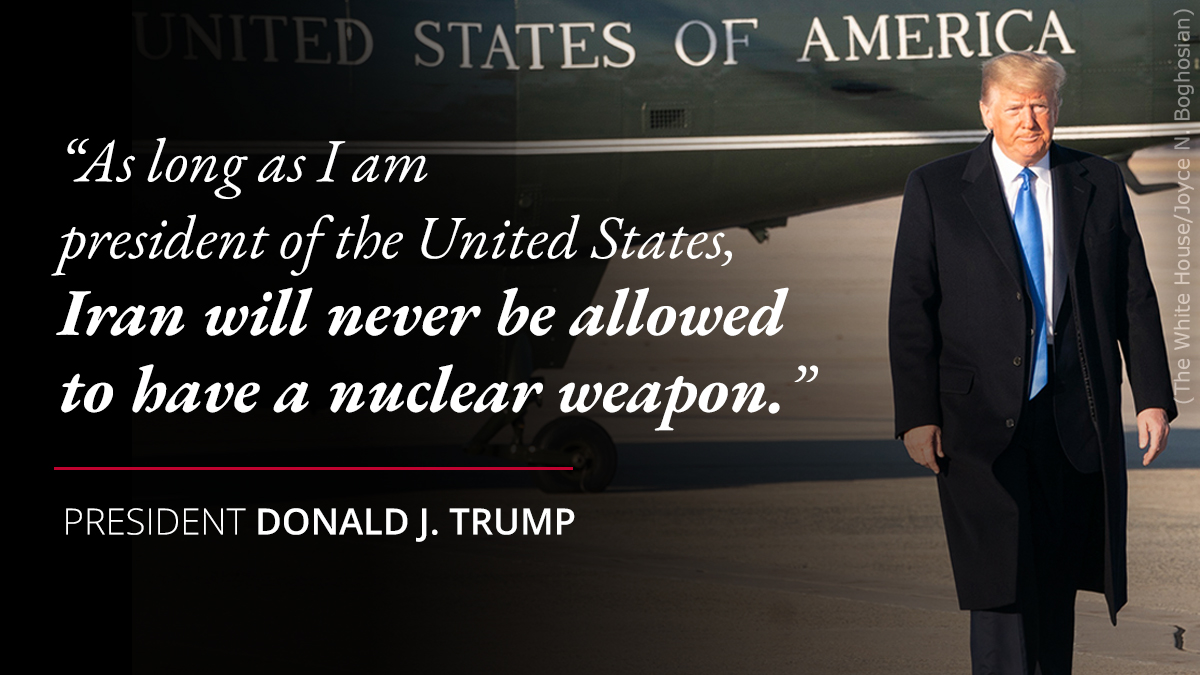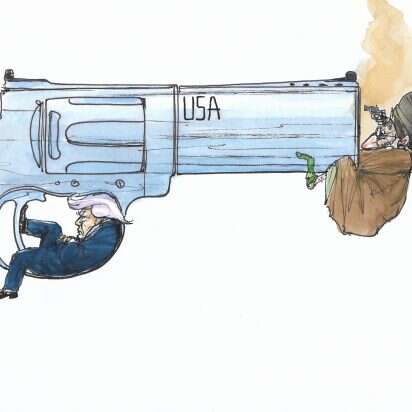Noah Rothman: Has Iran Blinked?
On Tuesday night, that response came in the form of a barrage of ballistic and cruise missiles launched from Iran at U.S. targets inside Iraq. But the volley produced no casualties—a conspicuous outcome given Iran’s capabilities. Their targets did not include some of the positions where the U.S. forces were concentrated in the largest numbers and excluded some likelier targets closer to the Iranian border. In the wake of the strike, Iranian foreign minister Javad Zarif talked about Iran’s retaliatory response in the past tense, telegraphing a desire to deescalate. Donald Trump’s refusal to respond to the Iranian volley indicates that Washington got the message.Ben Shapiro: Trump’s Iran Policy Isn’t the Problem. Barack Obama’s Was.
It would be premature to suggest that the crisis is over, but it is possible that a worst-case scenario has been averted. For American policymakers, the most pressing threat posed by Iran is its capacity to execute deniable attacks against soft targets and civilians in theaters far removed from the Middle East. That threat will persist, but the prospect of direct and conventional conflict between the United States and Iran has dissipated for now. If Iran returns to a strategy of unconventional and asymmetric attacks against the U.S. and its allies, it would be a reversion to the status quo ante that has prevailed for the better part of the last 40 years. That’s hardly ideal, but it would represent a dramatic retreat from Iran’s strategy of taking direct (or implausibly deniable) action against U.S. and allied assets, personnel, and interests.
On Wednesday, commentators and media figures praised Iran’s restraint and suggested Tehran had provided the president with a way to deescalate the conflict if he so chose, but this is a myopic and unfair assessment of how the Trump White House managed this crisis. This administration didn’t accidentally stumble its way into a textbook strategy for defusing a cascading spiral of violence against a revisionist adversary. It’s too soon to say if Iran is once again deterred, but there is reason to be cautiously optimistic. If there is any credit to be doled out at this early stage, it’s the Trump administration, not the Mullahs, who deserve it.
This is a deliberate misreading of history designed to absolve the Obama administration of its Iran policy debacle. The administration pursued a policy of strengthening Iran economically — and did so while openly acknowledging that Iran would use that newly gained economic strength to pursue terrorism and ballistic missile testing. In speaking of the sanctions relief given to Iran, then-Secretary of State John Kerry explained in January 2016, “I think that some of it will end up in the hands of the IRGC or other entities, some of which are labeled terrorists.”Ben Shapiro: Iran Loses Its Showdown With Trump
That’s precisely what happened. In March 2016, then-U.S. Central Command nominee Army Gen. Joseph Votel said that Iran had become “more aggressive” since the advent of the nuclear deal. Indeed, Iran has built up Hezbollah in Lebanon, propped up Bashar Assad in Syria, increased its presence in Iraq and bolstered its war in Yemen. In the past few months, Iran and its proxies have attacked shipping in the Strait of Hormuz, Saudi oil facilities, an American drone and an American embassy, among other targets. All of this occurred while the Trump administration did little or nothing in response.
Then Trump ordered the killing of Soleimani. Suddenly, we have been informed by dishonest Democrats and their media allies, Iran has gone rogue.
Nonsense. Iran has been rogue for decades. The Iran deal was simply an attempt to whistle past the graveyard with the terror regime — to pay it off long enough so that President Barack Obama could declare the problem handled. This was, after all, the Obama strategy in Crimea and Syria: Declare a red line; run away from it; pretend that pusillanimous inaction is bravery and deterrence provocation.
Trump thought differently. Now Iran has come face to face with the prospect that actions have consequences — and those consequences don’t involve pallets of cash being shipped over to fund terror organizations that span the globe.
At this point, it behooves the administration to allow Iran to save face. No Americans were killed; the base was not American. What’s more, the Iranians will seek the last word in this latest exchange — which means that unless the United States is truly willing to go to war, we ought to let the Iranians save face with this tepid response.White House: Iran's Campaign of Terror Will No Longer Be Tolerated
The truth is that Iran came off poorly in this exchange. That’s not just because a ballistic missile attack that fails to damage American assets looks pitiful. It’s because Iran just undercut its entire case in Iraq. In the aftermath of Soleimani’s killing, the left-wing press, Democrats, and isolationist right in the United States were blaming Trump for escalating the Iranian situation; that take will not hold water after this latest response.
Meanwhile, Shiites in the Iraqi parliament were militating in favor of pushing America out of Iraq, suggesting that Trump had participated in aggression in Iraq by killing an Iranian terrorist there — but now Iran is responsible for firing on Iraqis in Iraq directly. Iran has also put itself in position for further diplomatic isolation from its erstwhile friends in Europe, who were already moving earlier today toward re-establishing sanctions thanks to Iran’s statements about restarting its nuclear program.
None of this is likely to raise sympathy for Iran at a time when they were attempting to shift blame for the current confrontation onto Trump. No matter how unpopular Trump is on the world stage, he isn’t bombing Iraqi soldiers or threatening military action against Western allies.
Iran did what it had to do to demonstrate that it wasn’t going to let Soleimani’s death pass without response. But Iran has demonstrated that at the center of its foreign policy lies the same rot at which the Obama administration winked and nodded — and that they were perfectly happy to fire ballistic missiles, perhaps paid for with Obama-era cash and allowed by the Iran nuclear deal, at Iraqis and Americans.
President Trump said Wednesday: "No Americans were harmed in last night's attack by the Iranian regime. We suffered no casualties, all of our soldiers are safe, and only minimal damage was sustained at our military bases....Iran appears to be standing down, which is a good thing for all parties concerned....No American or Iraqi lives were lost because of the precautions taken, the dispersal of forces, and an early warning system that worked very well."
"For far too long...nations have tolerated Iran's destructive and destabilizing behavior in the Middle East and beyond. Those days are over. Iran has been the leading sponsor of terrorism, and their pursuit of nuclear weapons threatens the civilized world. We will never let that happen."
"The civilized world must send a clear and unified message to the Iranian regime: Your campaign of terror, murder, mayhem will not be tolerated any longer."









































